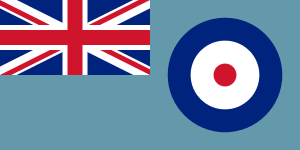RAF South Cerney
| RAF South Cerney | |||||||||||||||
|---|---|---|---|---|---|---|---|---|---|---|---|---|---|---|---|
.jpg) Control Tower on the Airfield | |||||||||||||||
| IATA: none – ICAO: none | |||||||||||||||
| Summary | |||||||||||||||
| Owner | Ministry of Defence | ||||||||||||||
| Operator | Royal Air Force | ||||||||||||||
| Location | South Cerney, Gloucestershire | ||||||||||||||
| Built | 1937 | ||||||||||||||
| In use | 1937 - 1972 | ||||||||||||||
| Elevation AMSL | 364 ft / 111 m | ||||||||||||||
| Coordinates | 51°41′27″N 001°55′28″W / 51.69083°N 1.92444°WCoordinates: 51°41′27″N 001°55′28″W / 51.69083°N 1.92444°W | ||||||||||||||
| Map | |||||||||||||||
 RAF South Cerney Location in Gloucestershire | |||||||||||||||
| Runways | |||||||||||||||
| |||||||||||||||
RAF South Cerney is a former Royal Air Force station located in South Cerney near Cirencester in Gloucestershire, England. It was built during the 1930s to conduct flying training. The airfield was turned over to the British Army in 1971 and is now known as the Duke of Gloucester Barracks.
History
Construction of the airfield began in 1936 and it was still underway when it opened on 16 August 1937. No. 3 Flying Training School was the initial tenant and was equipped with a variety of biplane aircraft which were replaced by Airspeed Oxfords in mid-1938. When Second World War began in August 1939, the school was redesignated as a Service Flying Training School (SFTS) and was equipped with 44 Oxfords and 31 Hawker Harts. Shortly afterwards the headquarters of No. 23 Group RAF, responsible for advanced flying training, was transferred to South Cerney with its communications flight. By the late summer of 1940, the Oxfords had replaced all of the Harts and the school was dedicated to multi-engine training.[1]
No. 15 Service Flying Training School was transferred to the base in early June 1940 with its Oxfords and North American Harvard trainers, but it moved to RAF Kidlington at the end of August. Soon afterwards, the syllabus of 3 SFTS changed to intermediate flying training and it continued in this role until 14 March 1942 when it was converted into No. 3 (Pilots) Advanced Flying Unit to orient foreign-trained pilot to British conditions and standards.[2]
During the Second World War a number of training units were posted to the airfield:[3]
- No. 1 Initial Training School
- No. 2 Flying Training School
- No. 27 Group Communications Flight
- No. 83 Gliding School
- No. 1519 Beam Approach Training Flight
- No. 1539 Beam Approach Training Flight
- Air Crew Allocation Unit
- Aircrew Officer Training School
The airbase was handed over to the Army on 1 July 1971 and was renamed the Duke of Gloucester Barracks.[4]
Runways
The site has two short runways that are regularly used by two commercial freefall parachuting businesses.[5][6]
See also
References
- ↑ Berryman, pp. 276–77
- ↑ Berryman, p. 278
- ↑ "South Cerney". Airfields of Britain Conservation Trust. Retrieved 22 August 2012.
- ↑ Berryman, p. 279
- ↑ Skydive South Cerney Archived March 19, 2011, at the Wayback Machine.
- ↑ "Welcome to the SILVER STARS Website". Silver Stars - RLC Parachute Centre. Retrieved 5 May 2011.
Bibliography
- Berryman, David (2006). Action Stations Revisited: The Complete History of Britain's Military Airfields. 5: South West England (New ed.). Manchester: Crécy. ISBN 978-0-85979-121-2.
